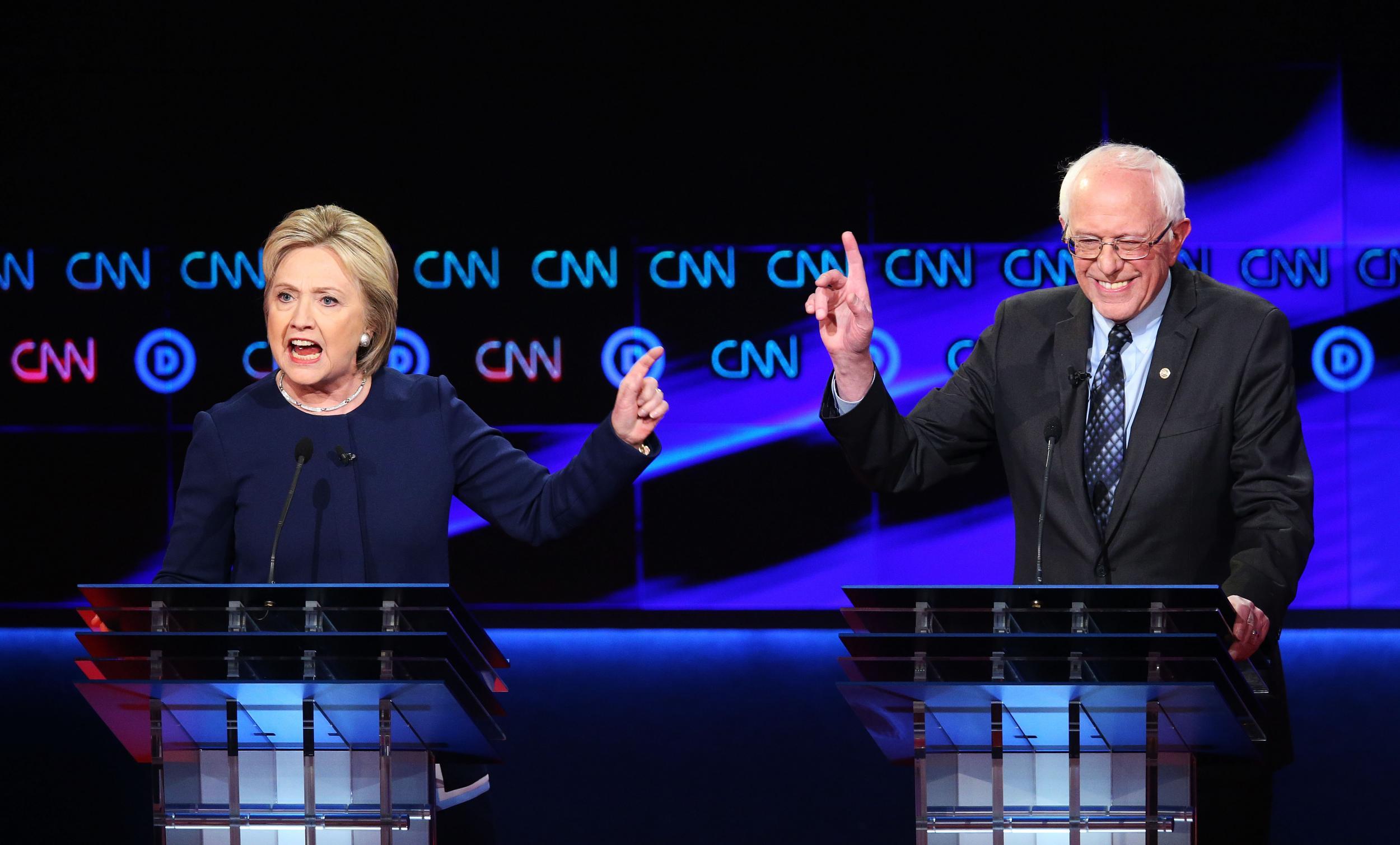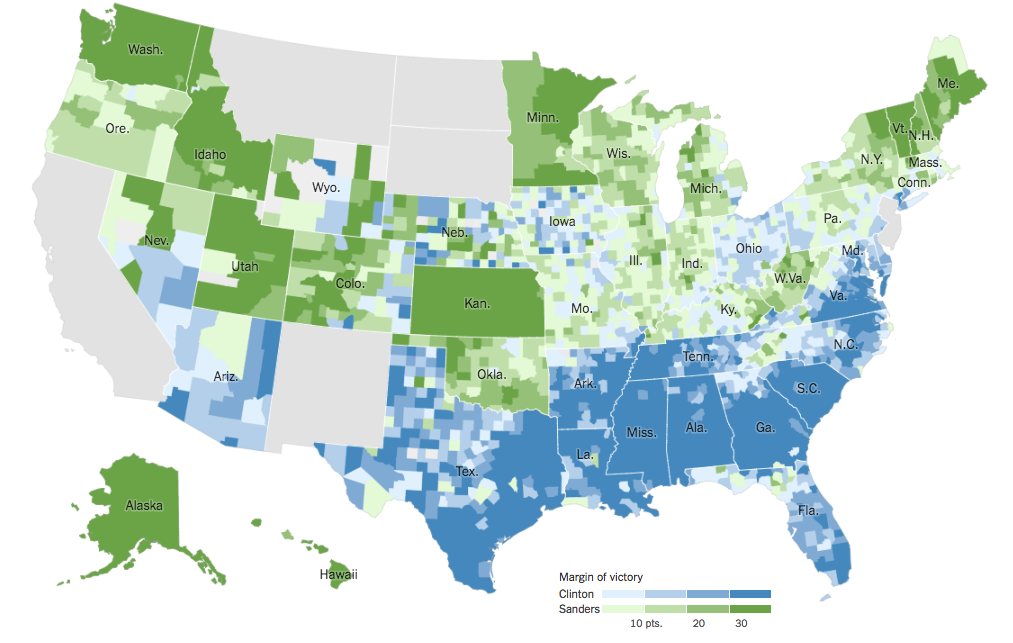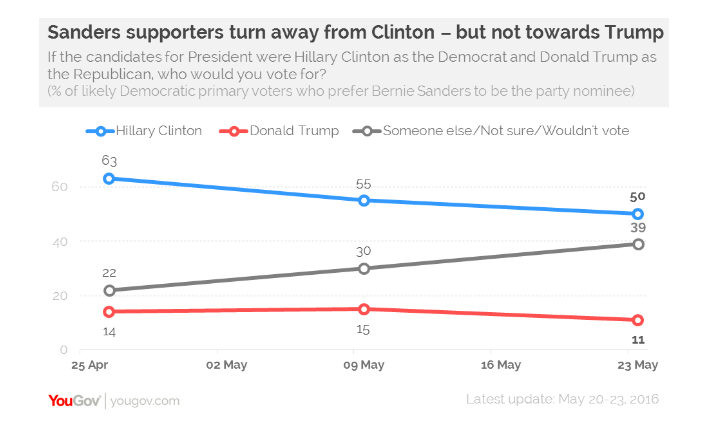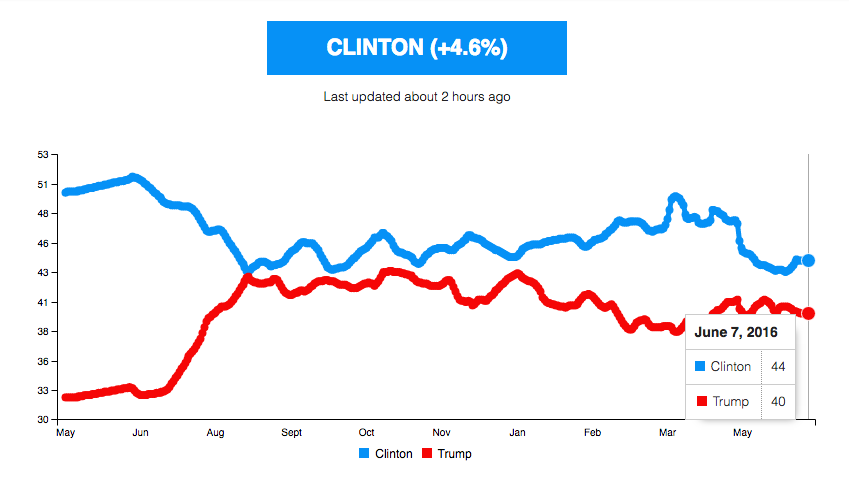How will Sanders affect a Trump v Clinton general election?
Regardless of whether Sanders drops out tonight, he will affect Clinton's chances this November

Tonight is surely the end for Bernie Sanders.
He may well beat Clinton today in California, the biggest state in the country, but his year-long bid to be the Democratic nominee is at an end.
Thanks to the support of ‘superdelegates’, Hillary Clinton has effectively clinched the nomination already, the Associated Press reported last night.
And after tonight, Clinton won’t need even these superdelegates.
So long as she wins at least 30 per cent of the delegates available in tonight’s contests (five other states are voting along with California), she will have won a majority of pledged delegates.
Here's how she and Sanders have fared across the country so far.

Pledged delegates are the ones allocated according to the democratic contests in these states; as opposed to the superdelegates, or party officials, who can support whoever they like – and who overwhelmingly back Clinton.
She won’t win less than 30 per cent. She’s headed for a big victory in New Jersey, which means Sanders needs to win California by about 60 points. Polls suggest they are tied.
But what if Bernie doesn’t drop out? Could he stand and win as a third party candidate? And if he couldn’t win, how would he affect a Trump v Clinton race?
Unfortunately, this is not a question that’s been polled.
Only 14 three-way polls have been published this year that involve Trump, and none surveyed a Trump-Clinton-Sanders race. They all pitted either Clinton or Sanders against Trump and some other third-party candidate.
So we are left guessing: what kind of voters might Sanders keep ahold of in a general election, and take away from Clinton or Trump?
Let’s start with who’s currently supporting him among Democrats. More than 280 Clinton v Sanders polls have been published in the past year.
This is how Sanders has fared.
It’s been a remarkable rise. And for the past four months Sanders has won over at least 40 per cent of Democrats.
He rose as high as 46 per cent on the eve of the New York primary in mid-April, but lost that state – his last-chance for victory – and has since dipped back down.
Nevertheless, two-in-five Democrats back him.
We can’t answer whether they still would if he ran as an independent (as I say, no polls), but we can look at what they’ve said about backing Clinton.
Let’s use YouGov’s most recent poll for the Economist, published a fortnight ago.
The poll comes out monthly, and its 2016 polls show a clear trend. Only half of Sanders’ supporters would back Clinton in a general election against Trump.
That’s down from nearly two-thirds just six weeks ago.

One-in-ten would back Trump over Clinton, and four-in-ten would back someone else, or aren’t sure, or wouldn’t vote at all.
If that’s true, that means one-in-five Democratic primary voters won’t back Clinton in November.
Democratic primary voters make up about half of Democratic general election voters (based on the 2008 and 2012 elections, and provisional results from this year’s primaries).
So in other words, one-in-ten of Democratic general election voters – Bernie’s hardcore supporters – don’t currently plan to back Clinton against Trump, even if Sanders drops out.
This may explain why Clinton is struggling to surpass 45 per cent in general election polls against Trump (who is hovering at around 40 per cent).
Obama won 53 and 51 per cent in 2008 and 2012, but without a tenth of his support she is stuck in the mid-40s.

That leaves an opening for Trump. A majority of the American people have an unfavorable opinion of him, but if half of Sanders’ supporters don’t back Clinton, Trump won’t need the backing of a majority of Americans.
But what if Bernie ran as an independent? He has repeatedly he wouldn’t, and he wouldn’t even be on the ballot in many states, whose third-party registration deadlines he has already missed, but he could stand as a write-in candidate.
It would be lunacy, but his continued candidacy over the past month – when it’s long been clear he can’t win – has already puzzled many pundits, and a year of having thousands of people attend your rallies and shout your name can encourage spectacular ideas.
If he did run, it seems likely he would keep a hold of almost all his supporters.
When asked by YouGov who they would back in a Trump v Sanders contest, more than 90 per cent say Bernie (7 per cent say Trump, which shows you can get single-digit support for just about anything in a poll – treat their findings as broad brushstrokes, not the lines of a super-fine pencil).
Of course that’s not the same question as “Who would you support in a Trump-Clinton-Sanders contest?”, but it seems safe to presume Sanders would retain his primary supporters, at least initially.
But there two other crucial questions we can’t really answer.
First, how liberal (and Sanders-supporting) are Democratic general election voters who don’t vote in the Democratic primary? Second, could he siphon off enough Trump supporters to build a real base?
He would need to win over significant chunks of both groups to have any chance of beating Trump and Clinton. With just his 40 per cent of Democratic primary voters, he would only win around 5 per cent in the general election.
His chances of winning over many general election Democrats would presumably be low. They are considered a less liberal group, given that they don’t vote in their party’s nomination process.
Yet that would suggest Sanders wouldn’t fare very well against Trump in a hypothetical general election.
The opposite is true. He fares better than Clinton.
Perhaps general election Democrats are more liberal than pundits think, or Trump’s voters are independent enough to swing to Sanders, despite the two being on opposite ends of the traditional political spectrum.
The only caveat for Sanders, who has spent much of the past month trumpeting his superior lead over Clinton in head-to-head polls versus Trump, is that a Sanders-Trump race would almost certainly not have been just a two-man race.
For a start, Michael Bloomberg, the former New York City mayor who recently ruled out a third-party run, widely hinted that he would have run if Sanders had beat Clinton and was opposed by Trump.
It’s no use Bernie pointing to polls against Trump. And it’s no surprise he doesn’t point to three-way polls.
Of the 14 few that we have, five pitted Sanders, Trump and Bloomberg in a three-way race, Bernie led in just one, with Trump ahead in three, and one a tie.
That’s a worse record than Clinton, who has led Trump in six of the nine three-way polls published in 2016, including five of the past six (which all rightly excluded Bloomberg).
Perhaps Sanders really could have beaten Trump in a head-to-head matchup.
But liberals shouldn't lament the end of Sanders’ run. That race was never possible, even if he did win the Democratic nomination.
The data suggests there is only path left for Bernie: to drop out.
Join our commenting forum
Join thought-provoking conversations, follow other Independent readers and see their replies
Comments
Bookmark popover
Removed from bookmarks